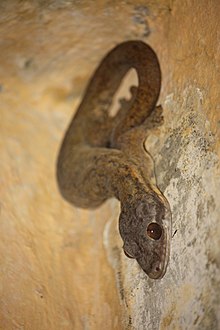The turnip-tailed gecko (Thecadactylus rapicauda) is a species of gecko widely distributed from Mexico southward through Central America and into South America as far south as Brazil, and on many islands in the Lesser Antilles. It was long thought to be the only member of its genus, until T. solimoensis was described in 2007.
| Turnip-tailed gecko | |
|---|---|

| |
| in Dominica | |
| Scientific classification | |
| Domain: | Eukaryota |
| Kingdom: | Animalia |
| Phylum: | Chordata |
| Class: | Reptilia |
| Order: | Squamata |
| Family: | Phyllodactylidae |
| Genus: | Thecadactylus |
| Species: | T. rapicauda
|
| Binomial name | |
| Thecadactylus rapicauda (Houttuyn, 1782)
| |
| Synonyms | |
| |
It is a large gecko, reaching a length of 120 mm snout-to-vent. Its color varies from pale to dark gray to deep orange. Individuals can also change color. It can vocalize a series of chirps, which it mainly does while active at night. Its name comes from its swollen tail, which is used to store fat. It also waves its tail as a sign of aggression, and can shed its tail to distract predators. They are nocturnal in nature and are frequently found 5–30 feet up the trunks of palm trees.
Names
editIt is called tai-marɛɁa in the Kwaza language of Rondônia, Brazil.[2]
Predators
editPredators of T. rapicauda include the phyllostomid bat, Chrotopterus auritus.[citation needed]
Parasites
editParasites of T. rapicauda include the malarial parasite Plasmodium aurulentum.[citation needed]
References
edit- ^ Avila-Pires, T.C.S.; Caicedo, J.; Chaves, G.; Cisneros-Heredia, D.F.; Gutiérrez-Cárdenas, P.; Lamar, W.; Perez, P.; Porras, L.W.; Rivas, G.; Solórzano, A.; Sunyer, J.; Wilson, L.D.; Murphy, J. (2019). "Thecadactylus rapicauda". IUCN Red List of Threatened Species. 2019: e.T190508A1953988. doi:10.2305/IUCN.UK.2019-2.RLTS.T190508A1953988.en. Retrieved 17 December 2024.
- ^ Manso, Laura Vicuña Pereira. 2013. Dicionário da língua Kwazá. M.A. dissertation. Guajará-Mirim: Federal University of Rondônia.
- Malhotra, Anita; Thorpe, Roger S. (1999). Reptiles & Amphibians of the Eastern Caribbean. Macmillan Education Ltd. pp. 15–16. ISBN 0-333-69141-5.
External links
edit- Media related to Thecadactylus rapicauda at Wikimedia Commons
- Thecadactylus rapicauda at the Encyclopedia of Life
- Thecadactylus rapicauda at the Reptile Database
- "Thecadactylus rapicauda". Integrated Taxonomic Information System.
